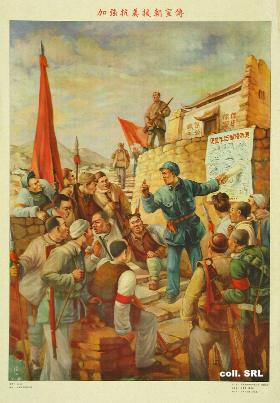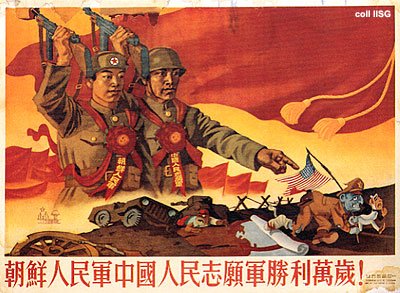FLIGHT OF THE CROOK-TALONED BIRDS

Chinese vterans of the “struggle against American aggression” in Korea relate tales of their adventures after returning home
Yesterday’s six-party agreement culminating in the announcement that North Korea was giving up its nuclear weapons program represented a triumph of Chinese diplomacy over American intransigence. Under its provisions, which remain to be finalized in another round of talks in November, North Korea is “assured” (if that is the right word) that it will not be attacked by the Unites States, that its national sovereignty will be respected by the five negotiating parties (in addition to the US and China are Japan, South Korea and Russia), and that Pyongang will receive substantial economic assistance in the future, including a light-water reactor for domestic energy needs.
China is for the moment satisfied, though Beijing must entertain serious doubts concerning the durability of such an agreement. Nations make and break such pacts with impunity, or selectively observe those articles which bestow an advantage while undermining or ignoring those which do not. In the short term at least, China has gained enormous prestige by protecting an important ally while forcing the Americans into a clear if orderly retreat. At the same time, she is aware that the Bush administration has no real intention of keeping any agreement that strengthens either North Korea or Chinese interests on the Korean peninsula. Yesterday’s announcement represents a tactical retreat on the part of Washington to buy time while it is busy elsewhere. Bush, aware at last that American power is fatigued and overextended by its numerous and self-inflected misadventures, is seeking a respite, not a fundamental change in the status quo.
The China/North Korea relationship, forged in revolution and war, troubled for a time by the Sino/Soviet split of the 1960s and reaffirmed and strengthened by the dissolution of Pyongang’s Soviet ally, looks more durable than ever. It is an irony of the post-Cold War world that American hubris as “the world’s sole superpower” has seen its badly calculated policies strengthen the bonds between its adversaries. The ties between Beijing and Pyongang will for a long time to come serve to vitiate American interests in east Asia and probably elsewhere.

Democratic Korea & Peoples’ China see off US “imperialists & their lackeys”
Kim Soo Yong
September 23, 2005 @ 2:27 pm
It should be pointed out, too, that all the major countries on China’s borders possess nuclear weapons, and the Americans have missles offshore near the Peninsula. This is a setback for Bush, or would be were he serious about fulfilling the terms of the agreement. He is not. His is a delaying action because American power is spread too thin and cannot successfully accomodate a new “crisis” in northeast Asia.
Comandante Gringo
September 23, 2005 @ 8:16 pm
I really like reading this.
But how close, really, is the chinese leadership to the North Korean leadership? Beside their mutual interests, that is?
I always thought that there was still plenty of mutual suspicion there: Capitalist Roaders vs. Juche Thought.
Richardson
September 27, 2005 @ 10:07 pm
Pakistan, India, and Russia have nukes. Are none of the other countries ‘major’?
There are limits to China’s influence on NK, but those limits depend on how much China want NK to exist; NK is making itself a trouble, which could change the math on this one.
http://www.dprkstudies.org/documents/asia007.html#boundaries
And;
WHAT A REALISTIC SIX-PARTY AGREEMENT MIGHT LOOK LIKE
http://www.dprkstudies.org/?p=82
Louis Godena
October 1, 2005 @ 9:54 am
I have yet to see convincing evidence that China is “troubled” by the game of bluff pursued by the DPRK. NK is a valuable “buffer state” between Beijing and the militarized, US-occupied southern penuinsula. With India’s entrance into the nuclear club (with apparently America’s blessing, if not outright collusion), the China/DPRK alliance can only be strengthened.